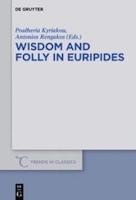
De Gruyter (2016) h/b 452pp £82.99 (ISBN 9783110452259)
Of making many books there is no end. Companions, Readings and Handbooks on the major classical authors flood forth. The trickle has become a tsunami. This may seem an odd complaint in a book review, but the fact is that even chalcenteric professionals cannot keep up with the flood, and there is a serious danger of some seriously good contributions to the debate such as a number of the essays in this volume failing to receive attention. If that happens, it’s a pity.
The twenty-three scholars who have contributed to this collection in honour of the Greek scholar Daniel Iakov (d. 2014) include some of the most lustrous names in Euripidean scholarship, and there is much eloquent writing here. Particularly valuable are the contributions of: G.O. Hutchinson, who traces the wisdom and folly of the gods from Homer to Plutarch and thus gives a context for what Euripides’ characters say; M.S. Mirto on the shifting polarities of wisdom and folly and sanity and madness in the playwright; R. Scodel on Euripidean slaves giving elite figures good advice; L. McClure who shows how Alcestis is thematically unified in an excellent discussion of Hestia and xenia (but why doesn’t Alcestis say anything at the end of the play?); J. Gregory on the education of Hippolytus (I hadn’t realized that the ephêbeia was not an institution in fifth-century Athens); M. Wright on how the idea of numbers links Troades and the lost Palamedes (but what about Alexandros, the other tragedy in the 415 trilogy?); S. Schein on sophos words in the best essay in the book; and D. Sansone in ‘Whatever happened to Euripides’ lekythion?’, a tour de force in which he argues that the lêkuthion apôlesen with which Aeschylus punctures Euripides’ prologues in Aristophanes’ Frogs means most obviously ‘had his oil flask stolen’. (He doesn’t rule out other resonances!)
Other fine representatives of current Euripidean scholarship are D. Susanetti, who may push his points too far in his discussion of how the destruction of Pentheus by Dionysus in Bacchae reflects the Athenian politics of the time, but even so writes cogently and stimulatingly. Good, too, to have P. Finglass writing about the fragment of Ino that we have come to think of as ‘his’.
The collection is well-edited, though in one of the essays the Greek is not translated, rather suggesting that the general reader is not the top priority. The title, however, is somewhat misleading: a number of the essays have nothing to do with the declared subject. Yet Euripides enthusiasts, amateur and professional alike, will find much here to enjoy and stimulate. I only hope that De Gruyter’s price does not put them off, and that the collection in not lost in the welter of such books of which I wrote at the outset.
James Morwood—Wadham College, Oxford
